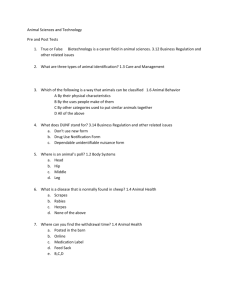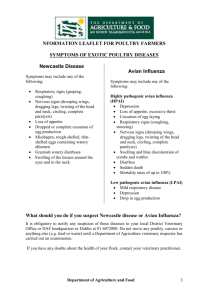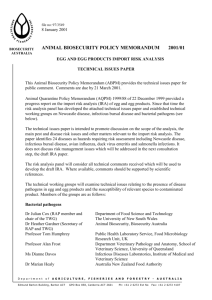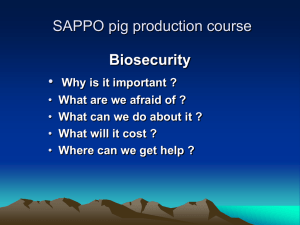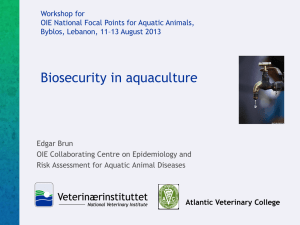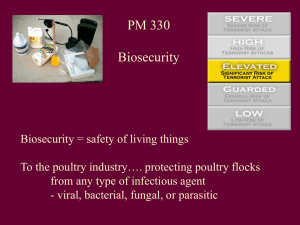Development of an Avian Influenza vulnerability assessment tool for
advertisement
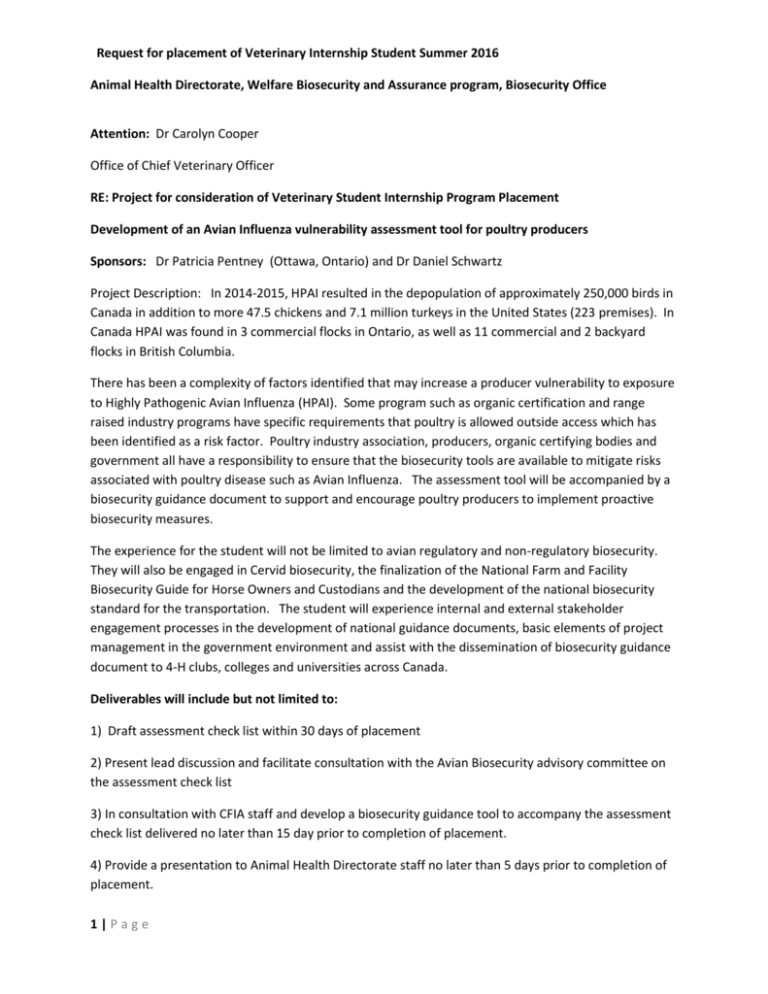
Request for placement of Veterinary Internship Student Summer 2016 Animal Health Directorate, Welfare Biosecurity and Assurance program, Biosecurity Office Attention: Dr Carolyn Cooper Office of Chief Veterinary Officer RE: Project for consideration of Veterinary Student Internship Program Placement Development of an Avian Influenza vulnerability assessment tool for poultry producers Sponsors: Dr Patricia Pentney (Ottawa, Ontario) and Dr Daniel Schwartz Project Description: In 2014-2015, HPAI resulted in the depopulation of approximately 250,000 birds in Canada in addition to more 47.5 chickens and 7.1 million turkeys in the United States (223 premises). In Canada HPAI was found in 3 commercial flocks in Ontario, as well as 11 commercial and 2 backyard flocks in British Columbia. There has been a complexity of factors identified that may increase a producer vulnerability to exposure to Highly Pathogenic Avian Influenza (HPAI). Some program such as organic certification and range raised industry programs have specific requirements that poultry is allowed outside access which has been identified as a risk factor. Poultry industry association, producers, organic certifying bodies and government all have a responsibility to ensure that the biosecurity tools are available to mitigate risks associated with poultry disease such as Avian Influenza. The assessment tool will be accompanied by a biosecurity guidance document to support and encourage poultry producers to implement proactive biosecurity measures. The experience for the student will not be limited to avian regulatory and non-regulatory biosecurity. They will also be engaged in Cervid biosecurity, the finalization of the National Farm and Facility Biosecurity Guide for Horse Owners and Custodians and the development of the national biosecurity standard for the transportation. The student will experience internal and external stakeholder engagement processes in the development of national guidance documents, basic elements of project management in the government environment and assist with the dissemination of biosecurity guidance document to 4-H clubs, colleges and universities across Canada. Deliverables will include but not limited to: 1) Draft assessment check list within 30 days of placement 2) Present lead discussion and facilitate consultation with the Avian Biosecurity advisory committee on the assessment check list 3) In consultation with CFIA staff and develop a biosecurity guidance tool to accompany the assessment check list delivered no later than 15 day prior to completion of placement. 4) Provide a presentation to Animal Health Directorate staff no later than 5 days prior to completion of placement. 1|Page Request for placement of Veterinary Internship Student Summer 2016 Animal Health Directorate, Welfare Biosecurity and Assurance program, Biosecurity Office Project timeline can be adjusted to placement dates as indicated above. Constraints and alternatives: There may be external pressure to advance this initiative prior to the student placement. In that event the student will be assigned development and research on specific elements of the livestock, poultry and deadstock transport standard. This will include but not limited to a summary document of biosecurity and the PEDV investigation, to support the development of the national biosecurity transportation of livestock, poultry and deadstock standard. A detailed project outline can be developed in the future if the AI vulnerability assessment tool project must advance prior to anticipated placement time period. Ranking criteria 1) Sectors proactively managing risks and Avian Influenza prevention/preparedness is a Government of Canada priority 2) Avian Influenza Preparedness and protection Canada animal resource base is a CFIA priority 3) Exposure to regulatory and non-regulatory biosecurity across multiple commodity sectors, stakeholder engagement best practices and government project/process management Thank you in advance for your consideration of this request for a placement from the Veterinary Internship Program. The biosecurity unit has previously participated in this program with the completion of a three year successful placement program for Dr Katie Clow and subsequent employment for 1 year prior to her return to the University of Guelph to pursue graduate studies. Dr Patricia Pentney 2|Page

